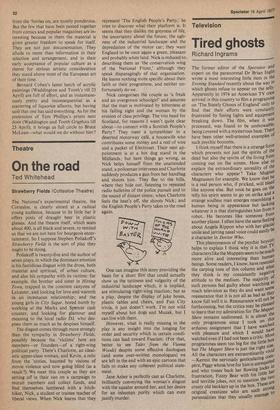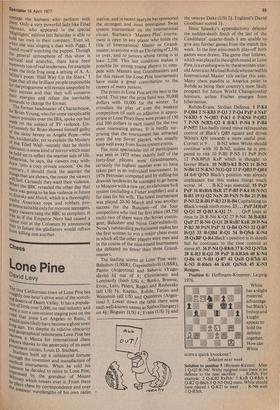On the road
Ted Whitehead
Strawberry Fields (Cottesloe Theatre) The National's experimental theatre, the Cottesloe, is clearly aimed at a radical young audience, because in its little bar it offers pints of draught beer in plastic glasses. And the theatre itself, which seats about 400, is all black and severe, to remind us that we are not here for bourgeois entertainment. So I suppose Stephen Poliakoff's Strawberry Fields is the sort of play they ought to be doing.
Poliakoff is twenty-five and the author of seven plays, in which the dominant emotion is his fastidious disgust with the dross, both material and spiritual, of urban culture, and also his sympathy with its victims: for example, the brother and sister in Hitting Town, trapped in the concrete canyons of Leicester, and looking for love and warmth in an incestuous relationship ; and the young girls in City Sugar, bored numb by working at the Marks and Spencer cash counter, and looking for glamour and meaning to the local radio DJ, who despises them as much as he despises himself.
The disgust comes through more strongly than the sympathy in Strawberry Fields, possibly because the 'victims' here are members—or founders—of a right-wing political party. There's Charlotte, an idealistic upper-class woman, and Kevin, a relic from the 'sixties, haunted by visions of movie violence and now going blind (as a result ?). We meet this couple as they are setting off in their van on a campaign to recruit members and collect funds, and find themselves lumbered tvith a hitchhiker, Nick, a student or trainee teacher of liberal views. When Nick learns that they represent 'The English People's Party,' he tries to discover what their platform is. It seems that they dislike the greyness of life, the uncertainty about the future, the ugliness of the industrial landscape and the depredation of the motor car; they want England to be once again a green, pleasant and probably white land. Nick is reduced todescribing them as 'the conservation wing of the National Front,' although they speak disparagingly of that organisation. He learns nothing more specific about their faith or their programme, and neither unfortunately do we.
Nick categorises the couple as 'a freak and an overgrown schoolgirl' and assumes that the man is motivated by bitterness at his failing sight and the woman by the erosion of class privilege. The trio head for Scotland, for reasons I wasn't quite clear about—to connect with a Scottish People's Party ? They meet a sympathiser in a deserted motorway cafe, a housewife who contributes some money and a reel of wire and a packet of Electroset. Their next appointment is at a hot dog stand in the Midlands; but here things go wrong, as Nick helps himself from the unattended stand, a policeman intervenes and Charlotte suddenly produces a gun from her handbag and shoots him. They flee to the hills, where they hide out, listening to repeated radio bulletins of the police pursuit and to the sound of distant sirens; when Charlotte feels the heat's off, she shoots Nick; and the English People's Party takes to the road again.
One can imagine this story providing the basis for a short film that could actually show us the tattiness and vulgarity of the industrial landscape which, it is implied, are stimulating right-wing reaction; but as a play, despite the display of juke boxes, plastic tables and chairs, and Fun City trivia, it just doesn't work. I'm not wild myself about hot dogs and Muzak, but I can live with them.
However, what is really missing in the play is any insight into the longing for order and security which in certain conditions can lead toward Fascism. (For that, better to see Tales from the Vienna Woods) despite some effective duologues (and some over-written monologues) we are left in the end with an epic cartoon that fails to make any coherent political statement.
Jane Asher is perfectly cast as Charlotte, brilliantly conveying the woman's disgust with the squalor around her, and her desire for an inhuman purity which can even justify murder.
The former editor of the Spectator and expert on the paranormal Dr Brian Inglis wrote a most interesting little item in the Evening Standard recently about the way Ifl which ghosts refuse to appear on the telly. Apparently in 1974 an American TV crew arrived :n this country to film a programme on 'The Stately Ghosts of England' only to find that their efforts were constantlY frustrated by fusing lights and equipment breaking down. The film, when it was processed, was found to be unshowable, being covered with a mysterious haze. There have been other well-attested examples of such psychic boycotts.
I think myself that there is a strange for
which prevents not just the spirits of the dead but also the spirits of the living from coming out on the screen. How else to explain the extraordinary unreality of the characters who appear? Take Magnus Magnusson for example. We know that he is a real person who, if pricked, will bleed like anyone else. But once he goes on the telly his spirit seems to go on strike and 8 strange soulless man emerges resembling human being in appearance but lacking whatever it is that distinguishes him from a robot. He becomes like someone from another planet. I often have the same feeling about Angela Rippon who with her glacial smile and jarring nasal voice could easily be a character in Doctor Who.
This phenomenon of the psychic boycott
helps to explain I think why it is that TV characters like the Muppets seem to be much more alive and interesting than human beings. Some readers, I know, have resented the carping tone of this column and what they think is my consistently negative attitude to the medium. The majority 01, such persons feel guilty about watching as much television as they do and want sorne reassurance that it is not all as bad as theY know full well it is. Reassurance will not bcei forthcoming, but the critics may be Please # to learn that my admiration for The MliPPe' Show remains undimmed. It is about ale only programme since I took on tills, arduous assignment that I have watcheo with pleasure and which I would have,. osgt watched even if I had not been a critic. M programmes seem too big for the little b0 but The Muppet Show is just the right size; All the characters are extraordinarily Vivi" —Kermit the nervously gesticulating conl; etel
pere, Piggy whose love for him is unrequit and who tosses back her flowing IOCkS Il . frustration, Fozzy Bear with his little bac; and terrible jokes, not to mention the two crusty old hecklers up in the box. These ang original creations who are such
stro personalities that they usually manage
uPsta.ge the humans who perform with thern. Only a very powerful lady like Ethel ,Merman, who appeared in the special Highlights' edition last Saturday is able to hold her own in their company. Even so, When she was singing a duet with Piggy, I found myself watching the puppet. Though the general atmosphere of this show is satirical and anarchic, there have been moments too of real tenderness, for example When the little frog sang a setting of A. A. Milne's poem 'Half Way Up the Stairs.' I hope that all the brilliant people responsible for the programme will remain unspoiled by their success and that they will conserve their energies and refuse the inevitable demands to change the format. The former headmaster of Charterhouse, Sir Brian Young, who for some inexplicable reason presides over the IBA, spoke out last Week on the subject of TV violence. Unfortunately Sir Brian showed himself guilty of the same heresy as Angela Pope—who nas, Incidentally, yet to explain the Mystery of the Tiled Wall—namely that he thinks elevisio is some kind of mirror which must be held up to reflect the seamier side of Otherwise, he says, the viewers may with'raw 'into a cos' private cocoon.' On the contrary, I should think the seamier the things that are shown, the cosier the viewers Will feel. Certainly they want their violence. V;1,11en the BBC revealed the other day that there was going to be less violence in future il)Starsky and Hutch, which is a thoroughly trashy American cops and robbers programme suitable only for moronic teenagers, angry viewers rang the BBC to complain. It .1.1.s as if the Emperor Nero had caused a ill.inor riot at the Coliseum by announcing that in future the gladiators would refrain trotti killing one another.







































 Previous page
Previous page